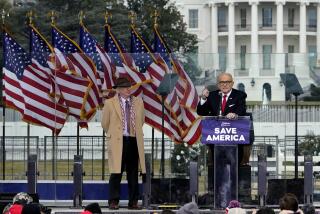Judge May Exclude J.P. Morgan E-Mails
- Share via
E-mails from J.P. Morgan Chase & Co.’s vice chairman describing transactions as “disguised loans” are so “explosive,” a federal judge said, that he might exclude them at a fraud trial involving 11 insurers.
U.S. District Judge Jed Rakoff is weighing whether to let jurors review e-mails from Donald Layton in a lawsuit filed by J.P. Morgan against insurers seeking to force them to pay $1 billion on surety bonds backing gas and oil transactions involving Enron Corp. The insurers refused to pay after Enron’s collapse, saying the bank masked loans to Enron as oil and gas trades involving an offshore entity.
Rakoff said Tuesday that he was leaning against admitting the e-mails because Layton didn’t write them about transactions at issue in the trial. Rather, the e-mails described Layton’s 1999 review of internal accounting when the bank advanced cash in certain commodities or equities derivative transactions.
“What makes this a close call is that the use of the term ‘disguised loans’ is an explosive one in the context of this case,” Rakoff said.
Layton testified at the hearing, where the contents of several of the e-mails were revealed. He said he began reviewing how the bank recorded certain transactions after learning about a complicated equities derivative in Hong Kong that he thought was handled improperly.
“We are making disguised loans, usually buried in commodities or equities derivatives,” Layton wrote in an e-mail. “They are understood to be disguised loans and approved as such. But I am queasy about the process.”
In another e-mail, Layton said the phrase “disguised loans” was “a pejorative phrase even if generally accurate.” He suggested that a more accurate phrase would be “derivatives-based fundings.”
At the hearing, Layton said none of the 1999 e-mails referred to transactions involving Enron, which sold oil and gas to a bank-sponsored entity, Mahonia Ltd. He said he used the phrase “disguised loans” as a colloquial expression to refer to cash disbursed upfront in certain commodities transactions.
He said he got e-mails from a bank employee in late 1998 describing the Enron transactions, although he didn’t recall them when he wrote his e-mails six months later. He said he learned of the Enron-Mahonia transactions only around the time of the energy trader’s bankruptcy filing in December 2001.
More to Read
Inside the business of entertainment
The Wide Shot brings you news, analysis and insights on everything from streaming wars to production — and what it all means for the future.
You may occasionally receive promotional content from the Los Angeles Times.










